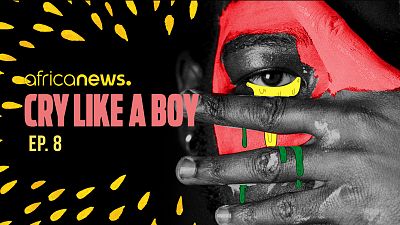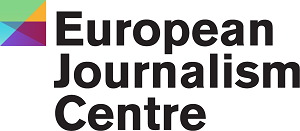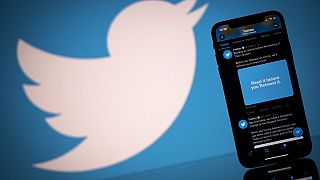Gender
In some African countries, homosexuals are forced to live in the closet to avoid being persecuted and targeted. In Europe, though homosexuals can be protected by the law, the LGBTQI community can still be discriminated against and feel segregated.
But did you know that homophobia has colonial origins in some African countries?
In the latest episode of Cry Like A Boy, we continue our conversation with Sheba Akpokli, who joins us from Lomé, the capital of Togo in West Africa. And Youssef Belghamaidi is a trans woman activist based in France. We will investigate and find out where the laws that punish same-sex relationships come from.
Like this episode? Share your thoughts on how you have challenged your view on what it means to be a man using the hashtag #CryLikeaBoy. And if you are a French speaker, this podcast is also available in French: Dans la Tête des Hommes.
Please do not hesitate to listen and subscribe to the podcast on euronews.com or Castbox, Spotify, Apple, Google, Deezer, and give us a review.
TRANSCRIPT: THE GÓOR-JIGÉEN IN CONVERSATION: SEXUAL COLONISATION - EPISODE 8
Khopotso Bodibe: Welcome to Cry Like a Boy, a Euronews original series and podcast that explores how the pressure to be a man can harm families and societies. Stay with us as we travel across the African continent to meet men who defy centuries-old stereotypes. Today, we continue our conversation with Sheba Akpokli, who joins us from Lomé, the capital of Togo in West Africa, and Youssef Belghamaidi, who is in Aubervilliers in France. Sheba Akpokli is a Togolese lawyer and LGBTQI+ rights activist, and Youssef Belghamaidi is a Moroccan trans woman activist based in France. I am also with you from Johannesburg, South Africa.
If you haven't listened to the first part of this conversation about gay rights and homophobia in Africa and also in Europe, please do yourself a favour and listen to it at our website www.euronews.com/special/cry-like-a-boy. Now, as we start this conversation, travelling back in time in the episodes of The Góor-Jigéen, we discovered that Senegalese society was much more tolerant of sexual and gender diversity a few decades ago.
The question that I have for our guests, for both Youssef and Sheba is: have you also seen an upsurge in homophobia in recent years in Togo and Morocco?
Sheba Akpokli: Yes, because I think it's somewhat of a response to the need for self-determination, the fall of our communities. You want to take this space and live freely. And the debate is highly influenced by the religious groups and sometimes the politics, you know because they want to have the public opinion with them. I remember this year when we were actually getting in all these COVID-19 things in Togo, like in most African countries, some religious leaders were bringing some messages that this COVID-19 is actually a punishment from God because of homosexuality. So you can easily understand that in this kind of concept, homophobia is actually spread every day in fact.
Khopotso Bodibe: What I hear you saying Sheba, is that as people in positions of authority pronounced against the LGBTIQ+ community, then they get the sympathy of people at the grassroots level in communities and that's actually making homophobia to be something that is quite rampant and quite noticeable throughout communities.
Sheba Akpokli: People listen to their leaders. In fact, as you know, Togo is a very religious country, even if the law doesn't say that. And people are used to listening to their leaders at religious places. And the speech in these places is not an inclusive speech. So people going back home will never be as inclusive as to tolerate any kind of diversity.
Khopotso Bodibe: Now, Youssef, is that your experience, too, in Morocco?
Youssef Belghmaidi: Absolutely. Morocco shares a lot of similar traits to the context in Togo. So obviously, the leaders, the political leaders in Morocco, which are embodied by the king, but mostly by the government, which is led by the Justice and Development Party, which is an Islamist fundamentalist party. So they actually do nourish de LGBTQ phobic pressures on people inside Morocco.
And when I was in Morocco, I used to hear a lot of people say, well, even if the government starts legalising stuff about LGBTQ, the mentalities in the country will not evolve because the mentalities are supposed to be the main problem. But I don't necessarily agree with that. I think that if the leaders were to advance in a good direction for LGBTQ, well most people would follow because they're the leaders and they’ve actually come a long way in this kind of political context, which is not that democratic and really about political leadership. So there's that about a specific upsurge.
We also had a lot of cases of homophobia, of transphobia over recent years, and we have a really violent and intense episode during the first lockdown. So it was in March, we had a trans influencer who started making calls to action to people, telling them to go on Tinder so they can find their cousins, their friends, their families. So there was like this massive outing campaign that happened. And it led to obviously massive violence, a lot of beatings, a lot of people getting thrown out of their houses, from their families. And it was really, really violent and made a lot of noise. And I think this specific event is to some extent confusing because why would a trans woman do that to gay people?
So I think that it is obviously way more complex than it looks. But obviously, not only it shows that homophobia and transphobia are still really strong in Morocco, but it also shows a lot of tensions and a lot of division inside the LGBTQ+ world. I like to use the word "world" or "galaxy" to talk about LGBT issues, I don't really like the term community because, well, in reality, it's not really one massive united community. It's a bit more divided than that. Activism has also been pretty intense and pretty strong, and like Sheba said, the upsurge in homophobia might be also linked to some kind of backlash because activism gets stronger.
Khopotso Bodibe: Now, if we look into the origin of the laws that punish homosexuality in Senegal, we discover that its origin is in the colonial laws, not in the culture of the country. A question to both of you. Do you know if homophobia also has colonial origins in Morocco and Togo?
Sheba Akpokli: I would say yes, it has because it should be remembered that many of our countries in West Africa share the same French-speaking colonial background. So we really had trouble breaking away from it, at least from the laws and regulations. Even if we try to update our legal documents, this source is still French law. So it's difficult. Before colonisation, there was nothing like that.
I remember when we were having the opportunity to lobby during the revision of our penal code, the one that we were using since the colonial period. We had the opportunity to lobby while there was the revision of the penal code, and guess what?
We lobbied but a little bit. But religion and the media had more impact than ever. So we didn't get what we wanted. In fact, the law has been increased.
So I think that we inherited this law from colonisation. And we kept it because we... I don't know why we kept it, but definitely, for instance in the case of Togo, you have that note that has never been used since the penal code has been updated in 2016 I think. But we still want to keep it. I don't know why we just do that. But we still keep this inheritance that we got from colonisation.
Khopotso Bodibe: What is the case in Morocco?
Youssef Belghmaidi: The parts of the penal code that represses homosexuality in Morocco directly come from France and especially from the criminal code that was written such as when Napoleon was in power in France.
If we also start talking about how all of this affects mentalities, how it affects people, well, it's not really unusual to hear. And in a lot of African countries and a lot of African cultures, people believe that homosexuality and trans identity are basically European stuff. And basically, none of this is African or anything like that. So I do find it quite interesting to see this gap between the fact that in many countries that used to be European colonies, we have repression that comes from colonialism.
And on the other hand, without homophobia and transphobia, it was some kind of proof of African purity, which is not I think that colonialism has also shaped the way that we address homophobia and transphobia because it also added some kind of racial resentment, even in la banlieue (suburbs in French), which are not that white- there are actually very few white people there - even there, when I hear the word pédé (faggot in French), when I hear this in the streets, I feel like people are basically saying that I abandoned my culture and that I'm basically acting like a bourgeois white person, which is not true.
The stigma isn't really sexual. It's really cultural. And it has been shaped into a racial problem with colonialism and neo-colonialism and the racism that comes from it.
Khopotso Bodibe: What I hear both of you be saying is that homophobia has been institutionalised. The influence actually comes from colonial origins. Now, the researcher, Christophe Broqua, explained to us how colonisation has globalised and standardised the categories of LGBTIQ+ ending the diversity of regions such as Africa. For example, before the arrival of colonialism in Senegal, Góor-jigéen was a term that defined the third gender in Senegal, not a gay person. Are there similar figures in the history of Togo and Morocco?
Sheba Akpokli: For sure, I would say globalisation does not only have positive effects. In our culture, we used to have these figures who were respected by everyone and never discriminated against because this is in our culture. We even have some words for that. Like I was saying, at the beginning of this conversation like nousugnon o nononusun.
Those people were really respected. There was a diversity in their identity. They were not considered gay before the colonialisation which brought a word on that. So I think it is totally a point that, yes, with the colonisation they did a globalisation of every identity, every gender. And yes, they just packed everything in just one umbrella-like LGBTIQ+ people, which was not different in our culture before.
Khopotso Bodibe: Let's hear your take on this Youssef.
Youssef Belghmaidi: Absolutely. It's pretty much the same thing in Morocco, we don't really have, like in Senegal, a specific identity like the Góor-jigéen, but we do have a lot of social-cultural aspects, cultural behaviours, cultural traditions that really have a lot of gender diversity and gender fluidity in them. Like for instance, it's getting rarer and rarer, but it used to be quite common to have, cross-dressing dancers in weddings, for instance, the most important thing isn't actually the cross-dressing, it is cross-dressing only if you look at it and a certain standpoint. But, yeah, obviously with globalisation, there has been a normalisation in the way that LGBTIQ+ persons should behave and should identify themselves.
But the reality of that is that in Morocco, but it's not just in Morocco. But I'm going to talk about it in Morocco. We have a lot of identities. We have a lot of behaviours. We have a lot of practices that don't even fall into the traditional gender binary.
So in order to really comprehend these things and all of their nuances and details, we really have to leave the gender binary to the side because it's really not about a third gender, it's really more about a whole new system of comprehending gender fluidity.
Khopotso Bodibe: Just in one sentence. What positive examples do you know of West Africa about tolerance and richness of sexual and gender diversity? I'm saying here positive examples because we have been talking a lot about the doom and gloom. But there should be something that is positive out of this. What sort of positive examples can you share with us just in one sentence, Youssef and Sheba?
Sheba Akpokli: I think the fluidity of gender in our culture, for instance, there are some traditional parties in my country and in West Africa where you can dress up, and it is perfectly OK. No one is going to attack you. So I'm just going to keep on this positive note.
Khopotso Bodibe: Thank you so much. Youssef, any positive experience from your side?
Youssef Belghmaidi: The fact that you can dress up as you want is really quite heartwarming. When I used to live in Morocco, I used to dress up quite flamboyantly. It wasn't always an issue. I didn't get insulted every day or anything like that. I think that there's a lot to discover on what's outside the gender binary, what's outside the whole LGBTIQ+ umbrella.
We should obviously stick together for the LGBTQ identity and fight for rights, fight for civil protection, fight for an actual integration within society. But I think we should also look beyond the words and beyond what has been settled. When I think about Morocco, I don't necessarily think about the doom and gloom. I also think about the possibilities that the future holds for us. So we're going to hold on to that very strongly.
Khopotso Bodibe: Thank you so much to the both of you, Youssef and Sheba, for spending this time. We have gained a lot of knowledge from you both. Thank you so much for sharing your time and insights with us.
Youssef Belghmaidi: Thank you for the invitation. It was also very, very enriching for you.
Sheba Akpokli: Thank you. It was very interesting then. I did enjoy this conversation and I hope you people as well.
Khopotso Bodibe: Thank you so much for your time. The both of you, Youssef and Sheba, thank you for joining us for this episode of Cry Like a Boy.
CREDITS:
This show has been produced with me, Khopotso Bodibe, Marta Moreiras in Senegal, Marta Rodríguez-Martinez, Lillo Montalto-Monella, Naira Davlashyan and Arwa Barkallah in Lyon. Special thanks go to Lory Martinez, Clizia Sala and Studio Ochenta for helping us produce this podcast. Theme by Gabriel Dalmasso.
I would like to thank our guests Sheba Akpokli and Youssef Belghmaidi. For more information on Cry Like a Boy, a Euronews original series and podcast, go to Euronews.com to find opinion pieces, videos and articles on the topic.
Follow us on Twitter @Euronews is our Twitter handle and we are @Euronews.TV on Instagram. Also, share with us your own stories of how you changed and challenged your view on what it means to be a man using the hashtag #crylikeaboy. If you are a French speaker, this podcast is also available in French "Dans la tête des Hommes" is the name of the podcast series.
This programme was funded by the European Journalism Centre, through the European Development Journalism Grants programme. This fund is supported by the Bill & Melinda Gates Foundation.



















00:58
Senegalese PM Sonko says international order is shifting to a more balanced, multilateral world
01:00
Pix of the Day: July 3, 2025
01:12
Senegal: Ousmane Sonko's defamation conviction upheld by Supreme Court
Go to video
Senegal’s finest sheep vie for bloodline prestige at pageant
01:06
China, Senegal pledge stronger strategic partnership during Beijing talks
01:43
TikTok star Khaby Lame plays soccer in Brazil after US detention